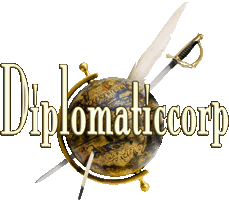"
Well, why not? Cheating is hardly out of place in a game which makes a cardinal virtue of deception."

according to the 1979 2nd edition Gamer's Guide to Diplomacy.
Then that was the board game and we're playing online without any face-to-face contact. Does it make a lot of difference? Yes, I think it does.
So it should not surprise anyone that the rules for the online game have been adjusted to its medium. Remember that the only way we know the other players is through this game. Our tactics determine how we're perceived. And I think that this is where there is a danger in cheating in online Diplomacy: others may perceive a 'cheater' in the game as a cheater in real life. That would definitely bar the cheater from ever being able to agree on a pact with the others. Of course, players should not expect someone to act in a similar way across all games. But let's confess: don't we all anticipate this in a way?
So I wholeheartedly agree with the conclusion at the end of the 2nd edition's chapter on Cheating: "
Cheating is of course no substitute for thorough negotiations and sound strategy and tactics. It is a technique that will help on a rare occasion and should be used with great restraint."

